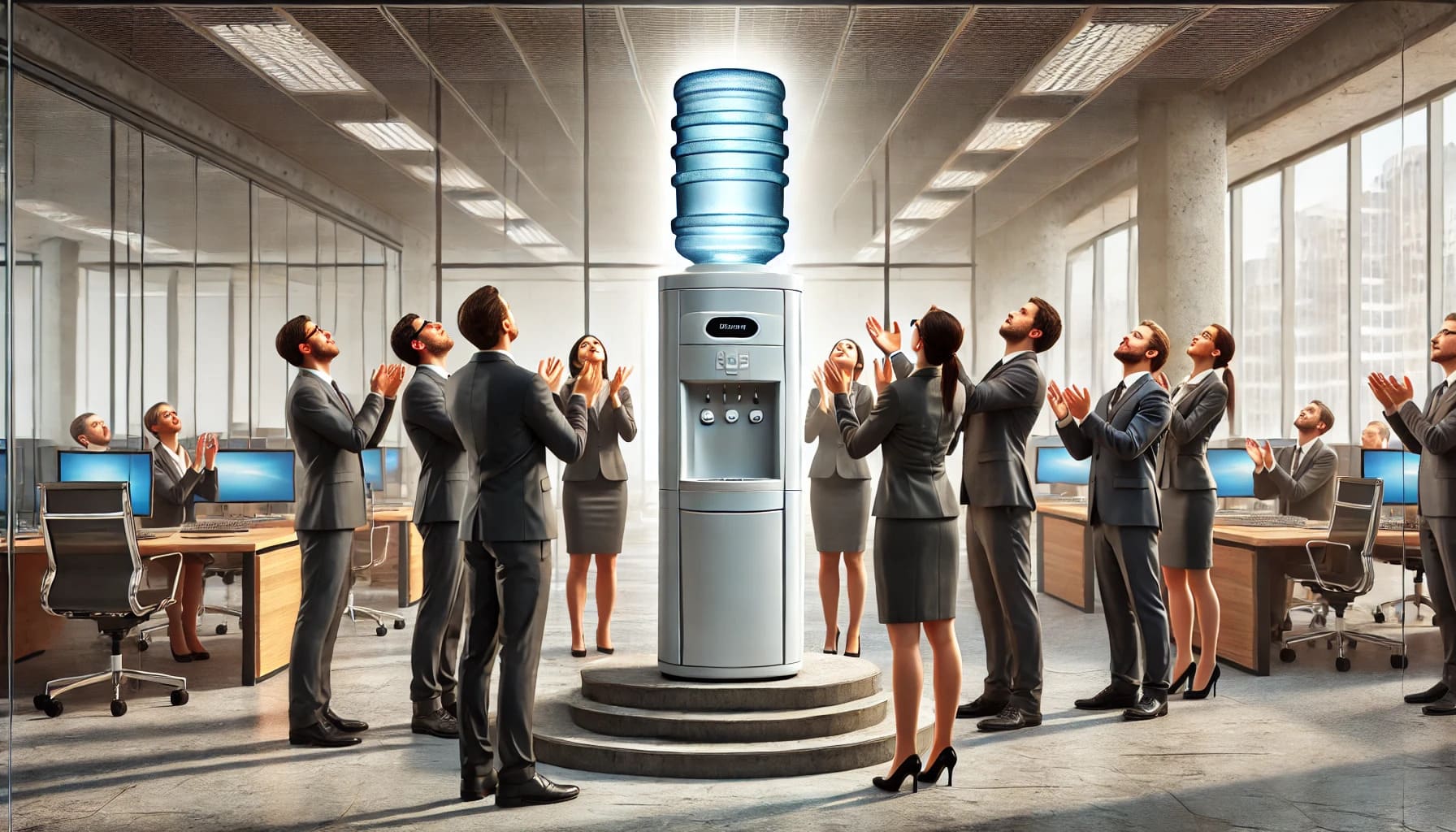
It will be of absolutely no surprise to anyone that there is a resistance to the “RETURN TO OFFICE” mantra being released from the mouths many CEOs across the world like so much raw sewage into our waterways.
The pandemic changed the relationship people have with their jobs. The power CEOs had over their employees melted away like their promises of pay increases1.
If people did not realise how much time they were wasting on commuting2 to and from an office, they surely did now. I was working as a software developer at a medium sized firm from 2017 to 2022 and, like most jobs back then, it was an office job. All my jobs had been office jobs. This had never made sense to me. Software development is one of the prime examples of a role that can be done from home, and in my opinion, suffers for being in the offce full-time.
Open-plan offices, team-building activities, pizza parties. Urgh, the memory of these still haunts me, and I wish I had the conviction back then to push back on these artificial attempts to increase productivity.

I don't want a fucking pizza, I want a minimum 6% payrise to beat inflation and reward my efforts over the last year to maximise the company profits
There is, unfortunately, a section of society that echoes the CEOs’ words - the sycophant, the extravert, the drone.
Their reasons for getting back into the corporate cage may appear myriad and nuanced, but they all distill down to the same core: they are all selfish.
The Office Sycophant
The office sycophant will attempt to ingratiate themselves with managers through various means, such as flattery, yes-man behaviour, undermining others etc. I have worked with several of these types of people in the past, and they are toxic3 to be around.

Great idea, Brad. If we increased everyones' working hours to show the same commitment to their role as you, I could buy another Porsche!
These anthropomorphic ticks will burrow into the upper echelons of the company and become impossible to remove, siphoning the focus and attention from management to themselves.
Undermining others is another natural trait of the office sycophant, as they want to make themselves look better than their peers. A classic conversation between management and a sycophant follows:
Manager: “Who’s great idea was this?”
Sycophant: “Oh err that was me, of course, I was eavesdropping on conversations around me and am passing the idea off as my own spending my evenings learning this new thing!”
Boss: “Well done sychophant keep up the good work!”
Beware the sycophant, the underminer, the mind-thief4.
The Extravert
This person loves being around people, oversharing their own lives, monopolising meetings, overwhelming others in the team, and the sound of their own voice.
They know all the office gossip, having spread most of it themselves, and revel in the drama being created as if the office is their own personal TV show where they are the main character.

It's Series THIRTY-SEVEN of the ME SHOW where I bully the betas and impregnate Bektoria from accounts!
If you require a moment of peace to concentrate on your job, well, you’re out of luck because you’re going to need to recall all of the interesting things you’ve been up to at the weekend so they can be graded as “boring nerd shit” by Chadley5.
The Drone
The corporate drone is another pro-RTO shill who gets all their social interaction from the colleagues. They have no friends outside of the office, and are either divorced or wish they were. Their home life is so empty and awful that they cannot wait to roll into the office to escape their failed lives.
If there was no office to go to they would have to face up to the stark reality that something is fundamentally wrong with their home-lives, and so they try their hardest to extoll the virtues of the office grind and ensure the building is packed full of people for them to feel better about themselves.

Did I tell you about how much I hate my husband? Yes? Oh, well, anyway you wouldn't believe what he did this time.
The Problem With The Office
Other than the type of people described above, the more insidious office behaviour is that of the work persona.
Nobody is authentic in the office. They are all putting on a show.
People worry about money, which is intrinsically linked to their job. If they were to reveal too much of their own personality in the office environment, others may view them negatively6 which may impact their chances at getting more money, or a promotion, or even staying in the role at all.
There is constant pressure in an office to be FAKE. You need to pretend to be engaged with your work (wooo insurance, I sure do love subrogation and credit hire claims) and enjoy working alongside people who are varying levels of lazy, incompetent, try-hard.
When somebody actually shows their true self it comes off as weird, at least in my industry. I think we’re supposed to all be robots who live to code.
Working with fake people is exhausting. Pretending to be somebody else is exhausting. No wonder there are such high levels of burnout.
The Water Cooler
The fabled “water cooler conversation” that CEOs harp on about is a myth. There are no water cooler conversations that are taking place in offices that “spark conversations” about work.
The only conversations that are sparked are people complaining about the company and the people at the company7.
All decisions are made by committee, so you’d better get the other 14 people to gather round that water cooler with you. These designs and strategies are discussed in long, boring meetings, not a 5 minute plastic-cup-inspired chatette.
Will the improvements that would come out of these decision cost money to implement? Well, stop thinking about it then, as you need to spend your time making stuff that will make money now.
Another thing the bothers me about the RTO mantra is how much better everything is supposed to be when everyone is in the office. Do CEOs think we’re all stupid? For the longest time there was no remote working. The quality of decisions and products was still shit. I’ve worked on some very ropey codebases and they were all written in an office. Thinking of these in-office in terms of halcyon days is disingenuous at best, a goddamn lie at worst.

'Darn, here I am all inspired because I'm next to this water cooler, and I have no one to spark an industry-changing conversation with. Another revolutionary idea down the drain thanks to remote working.'
What about companies that don’t have a water cooler? Are we supposed to gather round the fucking kitchen tap instead? How will conversation flow if people aren’t physically bumping into eachother as they pass a water dispenser.
The Real Reason for RTO
Another obvious fact-drop for everybody - RETURN TO OFFICE IS DOUBLESPEAK FOR LAYOFFS.
Companies hired too many people during the pandemic, and salaries rose as workers moved around, and now companies want to offload a bunch of their staff. How best to achieve this? Should you do the honourable thing and pay them a redundancy settlement? Perhaps the CEO can forgo their annual bonus this year and allow their company to reduce the headcount while ensuring everyone can continue to pay their bills?
No, obviously not. The best thing to do is to mandate a return to the office. That way workers can be shown to not be adhering to their contracts, and you can sack them without paying a penny!
Mandating a RTO during an economic downturn is maximum scum behaviour. Employees are given a “choice” between complying or being sacked.
Given that nobody at work really exists, and water cooler conversations do not really happen, what purpose does the office serve?
25th September 2024
-
“According to our system there was one time where you submitted your timesheet 17 minutes late during Q2, therefore you can now only reach “Meets Expectations” for our review grading. Better luck next year! That 2% rise is yours for the taking!” ↩︎
-
Paid for by the worker themselves. We actually had to pay to go to work ↩︎
-
I was once taken aback when somebody called the sycophant a “radiator” whereas I was a “drain”. It took me a long time to realise that the other person was, in fact, another sycophant, sucking up to the first sycophant. It’s sycophants all the way down! I am still not ok with this ↩︎
-
Not the Gloomhaven class ↩︎
-
The pressure that social media places on people to have a highlights reel of their life seeps into this part of the office. I don’t do interesting things at the weekend, leave me alone ↩︎
-
Or worse, depending on the views expressed ↩︎
-
Group moaning is acceptable conversation ↩︎
